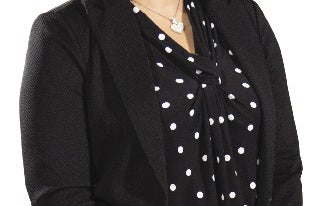Adrienne Hall-Phillips, associate professor in the Foisie Business School at Worcester Polytechnic Institute, is an accomplished professional Black woman. When I met Adrienne 10 years ago, I was jolted by a racist experience she had at work. Her narration of this event has played in my mind throughout the years. I have some shared racial […]
Get Instant Access to This Article
Subscribe to Worcester Business Journal and get immediate access to all of our subscriber-only content and much more.
- Critical Central Massachusetts business news updated daily.
- Immediate access to all subscriber-only content on our website.
- Bi-weekly print or digital editions of our award-winning publication.
- Special bonus issues like the WBJ Book of Lists.
- Exclusive ticket prize draws for our in-person events.
Click here to purchase a paywall bypass link for this article.
Adrienne Hall-Phillips, associate professor in the Foisie Business School at Worcester Polytechnic Institute, is an accomplished professional Black woman. When I met Adrienne 10 years ago, I was jolted by a racist experience she had at work. Her narration of this event has played in my mind throughout the years. I have some shared racial experiences with Adrienne, and, as a light-skinned, often racially ambiguous looking Black woman, I carry privilege she does not. I am compelled to speak out against racism, through my privilege of lightness affords me safety and trust and even respect not always automatic for BIPOC (Black, Indigenous, people of color).
What have the challenges been for you as a Black woman in corporate space?
I was in the corporate space for six years. My time there was actually pretty good, but it wasn’t without challenges. Although I worked for a Fortune 500 company, in my division there were very few people who looked like me in management. I already knew how to navigate these types of spaces, but what I wasn’t ready for was having to justify all of my work as a young, Black woman in rooms dominated by older, white men. I was smart and capable, but had to prove myself over and over again. I finally had a boss who supported me and didn’t subscribe to this country’s racial stereotypes. I got the opportunity to live outside of the U.S. I honestly don’t think that opportunity would have worked out, if he hadn’t been advocating for me.
Does racism show up differently in the STEM field? In marketing?
Racism shows up in both fields. I can’t say if one is much different than the other, since I was a STEM professional in corporate and now I’m an educator in the marketing field. What I can tell you is it’s extra hard for students and professionals of color to get jobs and promotions. I left the corporate space almost 15 years ago and things have not changed significantly. I speak with students on the job market and friends who have been in corporate spaces for 20+ years, and I hear the same stories. It’s likely harder for STEM professionals because many times they have more difficulty getting the initial opportunity.
How does racism show up differently in academia vs. corporate?
Academia for non-white males is a challenging place. It’s difficult to maintain work-life balance due to constant juggling of teaching, research, and service. Academia has a service component not part of the corporate world. Being a Black woman in academia comes with a service tax not burdening others. The spaces in academia are still not diverse. Trying to earn tenure and/or promotion without anyone who looks like you can be demoralizing. The few folks of color in a single institution of higher education are asked to take on an inordinate amount of service their white counterparts don’t have to do. This service can be serving on diversity committees, spearheading diversity initiatives, serving as the diversity advocate. Oftentimes, this work can lead to academics of color burning out and not having time for their own career advancement. Unfortunately, this additional work takes away from one’s ability to provide mentorship and community for students of color, which is desperately needed.
There are days when Adrienne becomes weary, especially during the last eight months of 2020, but she won’t stop fighting or give up. Changing systems and mindsets, learning and unlearning, and leaning into antiracism takes time. It’s not an overnight switch. Adrienne notes, “It requires intentional thought, planning, and commitment to wanting things to be different. It has to be part of every single decision and at every level of the organization. This is why we see small, peripheral efforts, but rarely does it lead to true change. We won’t see true change until these efforts are part of the fabric of our institutions.”
Bonnie J. Walker is the director of equity and inclusion at Worcester Academy, plying this arena in education in Mass. for 16 years. Contact her at bonnie.walker@worcesteracademy.org.

